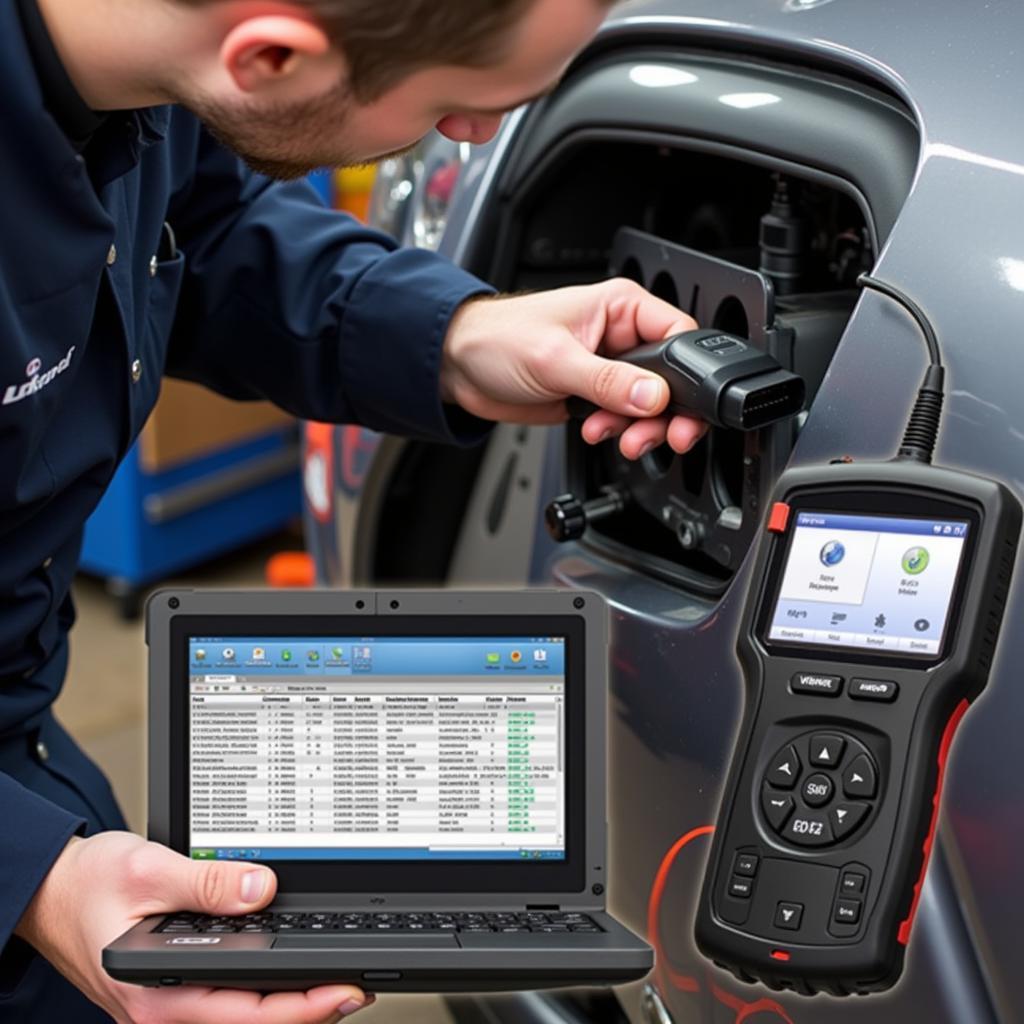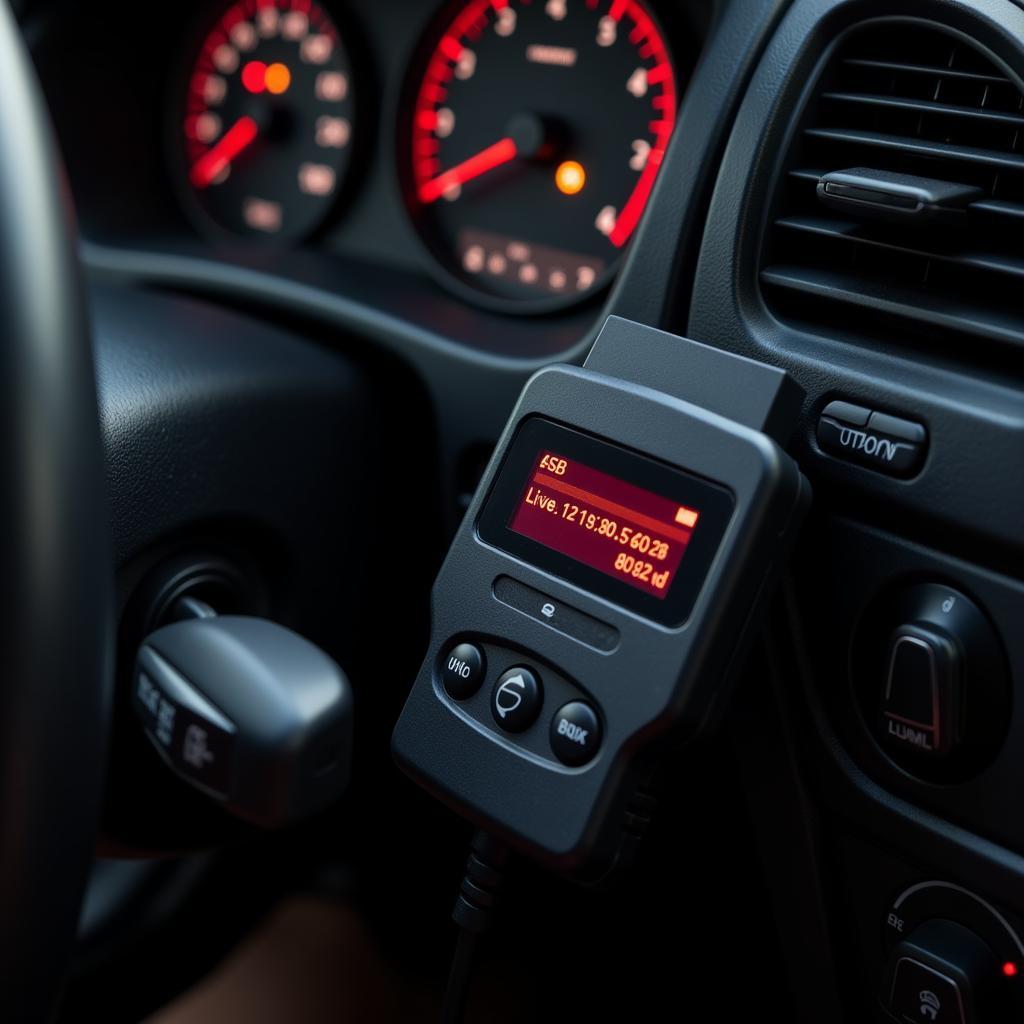In the ever-evolving world of automobiles, “Diagnostic In Car” has transitioned from a specialized term to a common phrase uttered by car owners and mechanics alike. But what exactly does it mean, and why is it so crucial for the health and performance of your vehicle? This comprehensive guide delves deep into the intricacies of car diagnostics, empowering you with the knowledge to navigate this vital aspect of car maintenance.
What is Diagnostic in Car?
 Car Diagnostic Tools
Car Diagnostic Tools
At its core, car diagnostics involve using electronic tools to communicate with your vehicle’s onboard computer system. This system continuously monitors various sensors placed throughout your car, collecting data on engine performance, emissions, safety systems, and more.
Think of it as a health checkup for your car. Just as a doctor uses medical equipment to diagnose human health, car diagnostic tools tap into your vehicle’s electronic brain, retrieving valuable information about its current state. This data is then interpreted to pinpoint issues, understand their severity, and guide repairs effectively.
The Importance of Car Diagnostics
Gone are the days of relying solely on a mechanic’s intuition and experience. Modern vehicles are complex machines with intricate electronic systems. Car diagnostics have become indispensable for several reasons:
- Accurate Issue Identification: Diagnostic tools can pinpoint the root cause of problems with remarkable accuracy, eliminating guesswork and unnecessary repairs.
- Early Problem Detection: Regular diagnostics can detect minor issues before they escalate into major, costly repairs.
- Enhanced Safety: By monitoring safety systems like airbags, ABS, and stability control, diagnostics ensure your car’s safety features are functioning correctly.
- Improved Performance: Addressing minor issues through diagnostics can optimize engine performance, fuel efficiency, and overall vehicle responsiveness.
Types of Car Diagnostic Tests
 OBD-II Scanner in Action
OBD-II Scanner in Action
There are several types of diagnostic tests, each focusing on specific areas of your vehicle:
- On-Board Diagnostics (OBD-II): This standardized system is mandatory in most cars manufactured after 1996. The OBD-II port, usually located under the dashboard, allows access to a wealth of information about engine performance, emissions, and other crucial systems.
- Manufacturer-Specific Diagnostics: While OBD-II provides a general overview, some issues require specialized diagnostic tools designed for specific car makes and models. These tools delve deeper into the vehicle’s systems, providing more detailed insights.
- Visual Inspection: Never underestimate the power of a visual inspection. A skilled mechanic can identify potential issues like fluid leaks, worn-out components, and other visible signs of trouble.
Common Uses of Car Diagnostics
Car diagnostics play a crucial role in various car maintenance and repair scenarios:
- Check Engine Light Diagnosis: One of the most common uses of diagnostics is identifying the reason behind a glowing check engine light.
- Routine Maintenance: Regular diagnostic checks during servicing can identify potential issues early on, preventing costly breakdowns.
- Pre-Purchase Inspection: Before buying a used car, a thorough diagnostic scan can reveal hidden problems and help you make an informed decision.
- Performance Tuning: Car enthusiasts and racers utilize advanced diagnostics to fine-tune engine parameters and optimize performance.
DIY vs. Professional Diagnostics: What’s the Right Choice?
While DIY car diagnostic tools are readily available, deciding between self-diagnosis and professional help depends on your technical expertise and the complexity of the issue:
DIY Diagnostics:
- Pros: Affordable, convenient for simple checks, empowers car owners with basic knowledge.
- Cons: Limited functionality, may not interpret codes accurately, risk of misdiagnosis.
Professional Diagnostics:
- Pros: Advanced tools, expert interpretation, comprehensive diagnosis, ensures accurate repairs.
- Cons: Can be expensive, requires finding a trustworthy mechanic.
Car Diagnostics: The Future of Car Maintenance
As cars become increasingly sophisticated, car diagnostics will continue to evolve, offering even more advanced features and capabilities. Here’s a glimpse into the future:
- Predictive Diagnostics: Imagine your car predicting potential issues before they even arise, scheduling maintenance proactively, and minimizing downtime.
- Remote Diagnostics: Car manufacturers are exploring remote diagnostics, allowing mechanics to access vehicle data and diagnose issues remotely.
- Artificial Intelligence (AI): AI-powered diagnostics will further enhance accuracy, speed, and the ability to identify complex issues.
Conclusion
“Diagnostic in car” is no longer a cryptic phrase but an essential aspect of modern car ownership. Understanding its importance, the various types of tests, and when to seek professional help empowers you to make informed decisions about your vehicle’s well-being. Embracing car diagnostics ensures your car remains safe, reliable, and performs at its best for years to come.
FAQs About Car Diagnostics
1. How often should I get my car diagnosed?
It’s generally recommended to have your car diagnosed at least once a year or every 12,000 miles, along with your regular maintenance schedule.
2. Can I drive my car with the check engine light on?
While you might be able to drive for a short distance, it’s crucial to get your car diagnosed as soon as possible to avoid potential damage.
3. Are all car diagnostic tools the same?
No, diagnostic tools vary in functionality and capability. Basic scanners provide general information, while advanced tools offer in-depth analysis.
4. Can I reset the check engine light myself?
While you can temporarily reset the light, it will reappear if the underlying issue is not addressed.
5. How much does car diagnostics cost?
The cost varies depending on the complexity of the issue and the mechanic’s rates.
You might also be interested in:
Need expert assistance with car diagnostics? Contact us via WhatsApp: +1(641)206-8880 or Email: [email protected]. Our 24/7 customer support team is here to help!

Leave a Reply